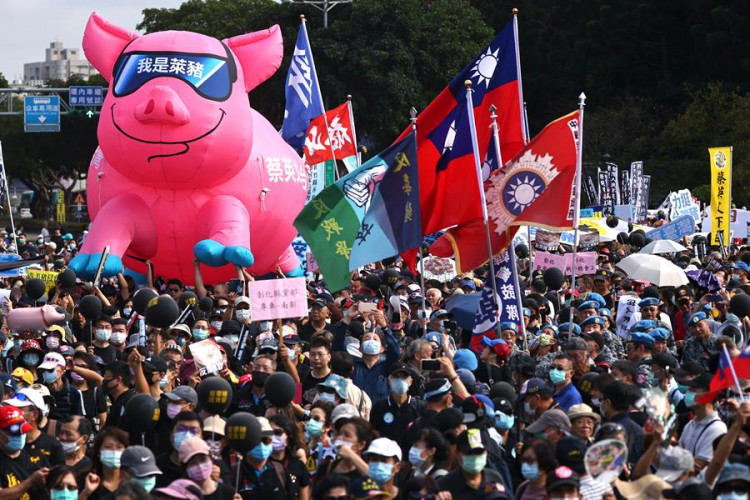Taiwan people want their pork nice and clean - without any chemicals from the U.S.
Tens of thousands took part in the annual Autumn Struggle protest march in Taipei on Sunday - spearheaded by labor groups - to condemn the government's plan to allow imports of U.S. pork containing ractopamine residue.
Taiwan President Tsai Ing-wen's administration eased a prohibition on imports of American beef and pork in August - a decision considered a first step toward a potential bilateral trade deal with the U.S.
The ban, set to be lifted in January next year, would allow imports of U.S. pork containing ractopamine - a chemical ingredient added to animal feed to boost the growth of lean meat. It is banned in China and the European Union.
The protesters - mostly clad in black and carrying a large pink inflatable pig - called on the president to revoke the executive order and for Taiwan Premier Su Tseng-chang to quit over government laws that sparked public anger, Autumn Struggle representative Lee Chien-cheng said.
"I have a child and when we eat things with ractopamine, it is bad for our bodies," Jacky Tsui, a 37-year-old factory worker said.
"I came here to oppose the import of ractopamine," said Kelvin Chen, a 54-year-old computer engineer who joined the protest.
Taiwan's main opposition party, the Kuomintang, rallied its supporters to join the protest after having led a campaign to oppose the decision - which it says is dangerous for food safety.
Kuomintang chairperson Johnny Chiang called on Taiwan's president to participate in a televised debate. "Taiwanese pigs do not eat ractopamine and yet you're asking the Taiwanese people to? Does this make sense?" Chiang told the estimated 20,000 supporters.
Taiwan gave the green light for imports of beef laced with ractopamine in 2012 but pork is more in demand.
Based on government figures, Taiwan imported more than 84,300 tons of ractopamine-free chilled and frozen pork costing around $221 million last year. Of that, more than 13% in terms of volume and 12.6% in terms of value came from the U.S.






